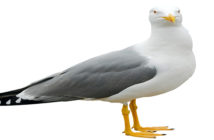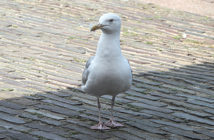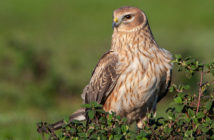The Government has bowed to pressure from wildlife activists, Chris Packham, Mark Avery and Ruth Tingay and, with effect from tomorrow, 25 April 2019, will be revoking three general licences for controlling wild birds. These licences (GL 04/05/06) cover 16 species of birds including several members of the crow family, Canada goose, some gulls and pigeons.
The three campaigners mounted a legal challenge to Natural England via their crowd funded Wild Justice campaigning organisation in February and it seems Government lawyers have accepted that the way these three general licences as issued is unlawful.

The three licences affected are:
General licence GL04: To kill or take certain species of wild birds to prevent serious damage or disease
General licence GL05: To kill or take certain species of wild birds to preserve public health or public safety
General licence GL06: To kill or take certain species of wild birds to conserve wild birds or flora or fauna
Natural England clearly isn’t 100% convinced as its press release puts the revocation down to: “a legal challenge to the way the licences have been issued, which could mean users who rely on them are not acting lawfully.” However we wouldn’t recommend ignoring the revocation and testing this in court.
Natural England also stresses that it is working at pace to put in place over the next few weeks alternative measures to allow lawful control of these bird species to continue, where necessary.
In the meantime, once the licences have been revoked and until new licences are issued, anyone needing to control one of these 16 bird species where there is no reasonable, non-lethal alternative will need to apply for an individual licence, says Natural England.
The organisation’s interim chief executive Marian Spain said: “We recognise this change will cause disruption for some people, but we are working hard to ensure it is kept to a minimum. We will bring forward interim measures as quickly as possible as the first stage of our planned review of the licences. We want to make sure our licensing system is robust and proportionate, taking into account the needs of wildlife and people.”
Lacking commonsense
The handling of this revocation does seem to be at odds with commonsense. The release says: “Natural England is undertaking new licensing assessments to support lethal control of certain birds in defined situations, such as to preserve public health and safety from the impacts of feral pigeons. It intends to start issuing these licences from week commencing 29 April when more details will be available. The release adds: “If people need to take action in the meantime they will need to apply for an individual licence, using a simplified process which will be available on the Government website from 25 April.
Surely it would make far more sense to have details of the new arrangements in place before revoking the current licenses. From tomorrow a pest professional faced with a feral pigeon in a food factory will no longer be able to legally shoot the bird but will have to apply to an already stretched Natural England for an individual licence. Whilst waiting for that to be approved what does the factory do? Shutdown? And what about the trapped bird that will be left to starve to death – hardly a humane solution!
Natural England says that in limited circumstances, people may be allowed to undertake urgent action in accordance with the existing requirements of section 4 of the Wildlife and Countryside Act 1981.
This may well provide a legal basis for controlling the pigeon in the scenario outlined above as this section says that an authorised person shall not be guilty of an offence by reason of the killing or injuring of any wild bird (other than a bird included in Schedule 1) if he/she shows that his/her action was necessary for the purpose of preserving public health or public or air safety or for preventing the spread of disease, provided that there is no other satisfactory solution. There is also a requirement to notify the Minster of State of the action taken as soon as reasonably practical plus you can’t use this legislation as a defence if it becomes apparent that you should have been able to predict that you would need to take the action you did as then you should have applied for a licence.
Natural England says that anyone exercising lethal control of birds after Thursday 25 April 2019 without taking the above steps will not be covered by a general licence and could be committing an offence.
If you are unsure Natural England suggests visiting its website but at the time of writing it stil refers to the general licenses. Of course this may all change tomorrow!
Background on the general licences
General licences were introduced in the 1990s to allow the legal control of bird species of low conservation concern to protect public health and safety, prevent serious damage and disease, and protect plants and wildlife.
Natural England says: “Further details of the wider review into the operation and provision of general licences will be shared shortly. We will seek feedback from those using them and from wildlife protection and other groups. We expect to complete this review by the end of the year.”



